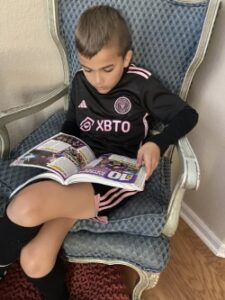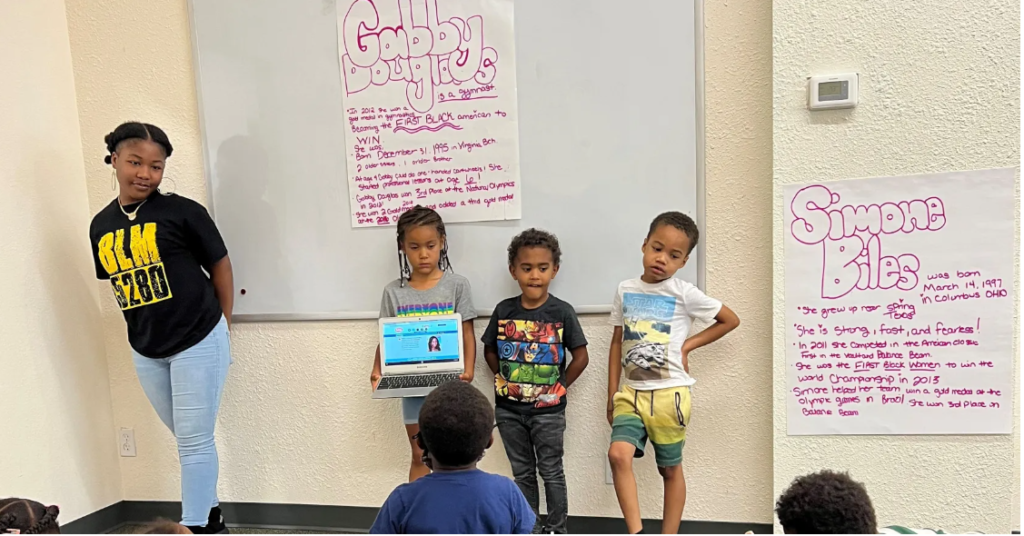In between rocking out to Guns ‘n Roses and scoring goals on the soccer field, Demir Tugsal buries his nose in books.

“He loves books, he loves visiting the library, he can’t get enough of it,” said his mom, Melissa Tugsal.
This year, Tugsal’s third-grader is one of nearly a quarter of the entire student body identified as “Gifted and Talented” (GT) or “Highly Gifted and Talented” (HGT) at Isabella Bird Community School.
The Central Park elementary school is home to a Gifted & Talented programming model that works to support the unique learning needs in every student.
“Your child could be a future leader, a future artist, a future change maker,” explains Dr. Robin Tobin, Gifted & Talented Coordinator at Isabella Bird.
Over the past three years, under Principal Rebecca Mercer’s leadership, Isabella Bird has created and carried out a Gifted & Talented program that sets it apart from other Denver Public Schools.
“We’re all about offering a full-time educational experience that truly strengthens the extraordinary talents of each child,” said Mercer.
A number of other Central Park schools have gifted and talented programs. For more information on those schools’ offerings, click here for a CPEdNews story from earlier this year.
While many local schools opt for a traditional ‘pull-out’ program, removing GT/HGT students from regular classrooms for small group activities, Isabella Bird takes a different approach. At Isabella Bird, GT/HGT students stay in their classrooms throughout the day while receiving special instruction when appropriate. This approach does two important things: It prevents gifted students from feeling isolated from their classmates since they remain in their classrooms, and their giftedness is front and center all day long, rather than set aside for a separate time.
“Gifted kids aren’t gifted for half an hour; they’re gifted all day long,” explains Dr. Tobin. “That’s why Rebecca [principal] introduced the ‘cluster grouping model’ and paved the way for GT/HGT teacher training across the school.”
Isabella Bird’s educators have either completed or are currently undergoing a two-year, training program, facilitated by the Denver Public Schools district, that is designed to give teachers the necessary skills and expertise to teach GT/HGT students.
The training covers a lot of ground. It helps teachers identify the needs of gifted students, which often results in tailor-made lessons and faster academic progress. But, the best part of all, teachers have noted a rise in engagement from all students when they apply their training that includes challenging academics, social and emotional learning, and a warm and welcoming environment.
“There’s often a myth that being gifted is like an easy street, but that’s not really the whole story,” said Dr. Tobin. “Oftentimes gifted students come with emotional intensity or perfectionism, and they need support on how to manage those things, so our social-emotional curriculum addresses that.”
Tugsal acknowledges that, for her son, the social-emotional curriculum at Isabella Bird is just as important as the Gifted & Talented programming.
“The emphasis the school places on social-emotional development is key. Demir, being a gifted student, is very emotional, yet he thrives thanks to the school’s teaching approach, communication, and overall structure,” Tugsal stated. “The way the teachers are able to cater to each child’s needs and meet them at their level is so helpful.”
At Isabella Bird, a universal screening process begins for students in Kindergarten. This non-verbal assessment, consisting entirely of pictures, is designed to be linguistically and culturally neutral. Depending on the outcome of the screener, a customized program is developed in collaboration with the school’s GT/HGT coordinator, the student’s teachers, and caregivers.
Children can exhibit gifted traits in a variety of ways.
Here is a list of characteristics of giftedness in early childhood:
- Achieves milestones earlier
- Heightened sensitivity
- Early language development
- Independence
- Quick learning with minimal repetition
- High energy
- Wide range of interests
- Organizes toys by grouping similar items
- Impatience or boredom with peers
- Advanced vocabulary
- Intense curiosity
- Exceptional memory
- Vivid imagination
- Proficiency in counting and grasping math concepts
- Attention to detail
- Developed sense of humor
- Leadership abilities
- Prefers the company of older children and adults
For more details on izzi B, visit the school’s website at this link.
(The Foundation for Sustainable Urban Communities supports Central Park-area schools with grants.)




